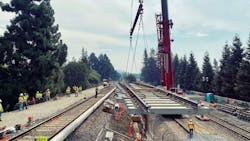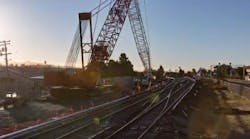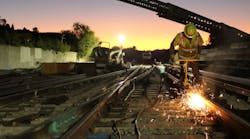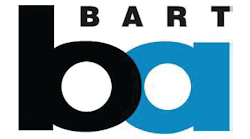Report: BART’s reduced service hours allowed for acceleration of infrastructure projects
A silver lining – perhaps the only silver lining - to a global pandemic can be found within the Measure RR Bond Oversight Committee’s fourth annual report, which found reduced service hours helped Bay Area Rapid Transit (BART) accelerate work on its massive Measure RR system rebuilding program.
Measure RR is a $3.5 billion bond measure that was approved by voters in Alameda, Contra Costa and San Francisco counties in 2016. The report examines the progress made on BART’s rebuilding efforts in each of the major program categories including Track, Power Infrastructure, Tunnels and Structures, Mechanical, Station Modernization, Station Access and Relieve Crowding.
BART is more than 25 percent complete with work included in the Measure RR program, which the report says exceeds projections made by the transit system when Measure RR was put before voters. At the end of March 2021, approximately $866 million of Measure RR funds have been invested, 126 rebuilding projects were in the planning, design or construction phases and an additional 22 projects are complete.
Highlights of the work include:
• The replacement of 34 miles of worn rail.
• The replacement of 31 track switches.
• The installation of 27 miles of 34.5kV electrical cable to ensure trains have a reliable source of power.
• Platform edges at seven stations have been upgraded to improve safety.
• The enhancement of 58 miles of third rail coverboards, which reduce failures that cause train delays.
• BART has completed four major station modernization and station access projects.
Additionally, the Bond Oversight Committee pointed to several key successes BART has achieved in the past year as part of the Measure RR program including:
• Awarding of the design-build contract for the Train Control Modernization Project.
• Major track replacement projects completed in Orinda, Hayward and Richmond.
• Completion reached on the Station Modernization Project at El Cerrito del Norte and the Powell Street Ceiling and Lighting Project.
The report notes because the capital projects were not paid for with operating funds, the reduction in ridership and related revenue didn’t impact the work. BART’s work window, which the report refers to as the blanket, nearly doubled when BART ended service at 9:00 p.m., allowing opportunity for work to accelerate.
The report points to several projects that moved forward due to this acceleration including:
• Downtown San Francisco 34.5KV electrical cable replacement project
• Oakland Wye/West Oakland 34.5KV electrical cable replacement project
• Rail Profiling for New Wheel Profile – multiple lines
• Third Rail Replacement Program
• Coverboard Enhancement
• Install Safety Barriers
• Running Rail Replacement – Systemwide
• Rail Direct Fixation Pad Replacement – Systemwide
• Earthquake Safety Program – Transbay Tube Retrofit
• Union City Station Modernization
• El Cerrito del Norte Station Modernization
The Bond Oversight Committee also included the projects were being delivered in accordance with best practices, are improving the rider experience through enhanced reliability of the system and BART is meeting the bond mandate to deliver on its public commitments.
The independent Bond Oversight Committee is comprised of seven members who represent a diversity of expertise. The organizations represented on the committee include the American Society of Civil Engineers, the Institute of Electrical and Electronic Engineers, the American Institute of Certified Public Accountants, the Association for Budgeting and Financial Management section of the American Society for Public Administration, the Project Management Institute and the League of Women Voters.
The full report is available to read here.

Mischa Wanek-Libman | Group Editorial Director
Mischa Wanek-Libman is director of communications with Transdev North America. She has more than 20 years of experience working in the transportation industry covering construction projects, engineering challenges, transit and rail operations and best practices.
Wanek-Libman has held top editorial positions at freight rail and public transportation business-to-business publications including as editor-in-chief and editorial director of Mass Transit from 2018-2024. She has been recognized for editorial excellence through her individual work, as well as for collaborative content.
She is an active member of the American Public Transportation Association's Marketing and Communications Committee and served 14 years as a Board Observer on the National Railroad Construction and Maintenance Association (NRC) Board of Directors.
She is a graduate of Drake University in Des Moines, Iowa, where she earned a Bachelor of Arts degree in Journalism and Mass Communication.





